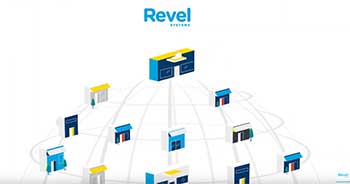When it comes to choosing a point of sale (POS) system for a small business, two top options are Revel and Lightspeed. Both offer robust features and have their own pros and cons.
This comprehensive guide compares key factors including pricing, hardware, integrations, and more to help small business owners determine which platform may be the better fit.
A Brief Comparison Table
| Feature | Revel | Lightspeed |
| Pricing | $99/month base plan | $69/month base plan |
| Hardware | Proprietary | Flexible options |
| Integrations | Good selection | Extensive options |
| Payment Processing | Built-in | Additional fees |
| Reporting | Robust | Powerful analytics |
| Customer Support | Phone, email, chat | Phone, email, chat |
Pricing And Plans
Revel offers a flat monthly rate for its software and hardware bundle starting at $99/month on a month-to-month contract. This basic Revel plan includes the POS software, two terminals, two receipt printers, a kitchen printer, and an employee management terminal.
Lightspeed’s basic monthly plan is slightly cheaper at $69/month. However, Lightspeed charges extra for hardware and additional features like advanced reporting and loyalty programs. The basic Lightspeed plan includes the POS software for one terminal only.
Both Revel and Lightspeed offer custom quotes for larger businesses that require more hardware and users. Upgrading to premium tiers provides access to enterprise-level features like advanced CRM and inventory management.

Pros For Revel:
- Straightforward flat-rate pricing
- Hardware bundle included
Pros For Lightspeed:
- Lower starting price for basic software plan
- Ability to pay only for the features needed
Also Read: Differences Between Lightspeed R Series And X Series POS Systems.
Hardware Options
A key difference between Revel and Lightspeed lies in their hardware offerings.
Revel uses proprietary hardware designed specifically for the platform. This can be a pro because Revel vetted and optimized the terminals, iPads, printers etc. to ensure seamless integration. However, businesses are limited to Revel’s hardware selection.
Conversely, Lightspeed offers far more flexibility. Users can choose from Lightspeed’s recommended hardware or bring their own iPads, tablets, computers etc. This gives businesses more customization capability. However, Revel’s proprietary approach may ensure greater reliability and consistency.
Pros For Revel:
- Purpose-built hardware optimized for the software
- Consistent, plug-and-play performance

Pros For Lightspeed:
- Flexibility to use third-party hardware
- Can repurpose existing iPads and tablets
Integrations And Apps
Both Revel and Lightspeed allow connecting the POS to an array of third-party apps and services. This expands the platforms’ capabilities and automation.
Revel offers good integration support for services like accounting, payroll, inventory management, quickbooks, booking, and delivery management apps. It has a Revel App Marketplace with over 100 apps.
However, Lightspeed truly shines when it comes to expansive integration options. It boasts an ecosystem of over 250 app partners. No matter your industry and specific business needs, Lightspeed likely offers an integration. The Lightspeed App Marketplace has tailored solutions for retail, restaurants, salons, golf courses, hospitality and more.
Pros For Revel:
- Good selection of popular business app integrations
Pros For Lightspeed:
- Massive integration ecosystem with 250+ apps
- Industry-specific integrations available
Payments, Invoicing And Other Features
Accepting payments is core to any POS system. Revel comes with built-in payment processing to help streamline transactions. It works with merchants’ accounts to accept major credit cards.
Lightspeed offers more payment flexibility – you can use integrated payments or third-party processors like Stripe. However, integrated payments cost extra on top of Lightspeed’s software fees.
For invoicing, Revel provides the ability to create and email invoices directly from the POS. Lightspeed also enables in-platform invoicing and adds estimate creation.
Both platforms support key POS features like inventory management, customer relationship management (CRM), and employee management. Revel has an edge when it comes to scheduling, timecards, and payroll functions. Lightspeed counters with superior data analytics and reporting.
Pros For Revel:
- Built-in payment processing
- Robust employee management features like scheduling and payroll
Pros For Lightspeed:
- Flexible payment options
- Advanced data analytics and reporting
Ease Of Use
Simplicity of use is important for a POS system. Revel and Lightspeed aim to provide intuitive interfaces that won’t slow down transactions.
Revel uses a single intuitive sales screen for taking orders and payments. Lightspeed similarly prioritizes fast order taking but also enables customizing the terminals with different apps and menus tailored to specific employees. It also lets managers quickly toggle between back-end admin tasks and the sales floor.
Both platforms offer robust training resources, including how-to guides, videos, blogs, and dedicated customer support. Lightspeed may have a slight learning curve given its deeper feature set. But overall the two systems were designed to get businesses up and running quickly.
Pros For Revel:
- Streamlined sales interface
- Dedicated customer training resources
Pros For Lightspeed:
- Customizable roles and menus
- Ability to easily switch between admin and sales tasks
Also Read: Differences Between Ramp And Expensify.
Customer Support
Having responsive customer support can make or break the POS experience. Both Revel and Lightspeed offer 24/7 live phone, email, and chat support. They also provide an online knowledge base, documentation, and video tutorials.
Lightspeed stands out with its community forums. Business owners can exchange advice and discuss best practices for using Lightspeed. The brand also has an extensive library of webinars and Lightspeed University provides free online training courses.
Pros For Revel:
- 24/7 live support via phone, email, chat
- Video tutorials
Pros For Lightspeed:
- Active community forums
- Webinars and online training courses
Scalability
A key consideration is each platform’s ability to scale along with a growing business.
Revel delivers strong scalability. It offers the Revel Router hardware to connect multiple locations. The Dashboard provides centralized reporting and analytics across all sites. Custom pricing plans are also available for larger enterprises.
Similarly, Lightspeed makes it easy to manage multiple locations while retaining a centralized customer database and inventory. It also caters to complex hospitality and retail environments with needs like tableside ordering and advanced warehousing. The system scales from single sites up to national chains.
In summary, both systems allow excellent growth capability and can adapt to businesses’ increasing complexity. Lightspeed may offer a little more flexibility for intricate hospitality and retail scenarios.
Pros For Revel:
- Multi-location support
- Centralized reporting
- Custom enterprise plans
Pros For Lightspeed:
- Seamless multi-site management
- Advanced hospitality and retail location needs
- Scales to chains
Also watch the review video of Revel!
Security
Security is a priority, especially with payment processing involved. Revel uses end-to-end encryption to protect card data. It is PCI Level 1 certified for compliant credit card acceptance. Access controls let managers restrict employee permissions.
Likewise, Lightspeed makes security paramount. It uses tokenization to encrypt payment information. The system is compliant with PCI DSS Level 1. User accounts and roles enable controlling access.
Both companies have strong security infrastructures including high-end firewalls and data encryption. Overall, businesses can feel confident trusting payment processing and data to either platform.
Pros For Revel:
- End-to-end encryption
- PCI Level 1 certification
- Granular employee access controls
Pros For Lightspeed:
- Tokenized payment data
- PCI DSS Level 1 compliant
- User accounts to manage access
Frequently Asked Questions (FAQ)
Yes, Revel is an excellent POS system especially suitable for small businesses. Key strengths include its easy-to-understand pricing, bundled hardware, robust POS features, and emphasis on operational simplicity.
Lightspeed is also a great POS brand. It stands out with its integration ecosystem, strong analytics and reporting, and flexibility for complex environments. Lightspeed caters especially well to growing restaurant, retail, and hospitality businesses.
Lightspeed is a dedicated POS system for in-person transactions, inventory, staff management, and store operations. Shopify is an ecommerce platform for building online stores and selling/shipping orders. Lightspeed partners with Shopify to connect physical and online sales.
Shopify is better for pure ecommerce businesses that only sell online. Lightspeed is better for physical stores that need point of sale registers, in-person sales, and store management capabilities. Many businesses use both Lightspeed for in-store POS and Shopify for their online storefront.
Also Read: Is Concur Professional Better Than Standard?
Which Is Better for Small Businesses?
In summary, Revel and Lightspeed are both excellent POS systems that can meet most small businesses’ needs. Some key pointers when deciding:
- Pricing – Revel straightforward flat-rate plans while Lightspeed offers lower software pricing but nickle-and-dimes for hardware and addons.
- Hardware – Revel provides proprietary, purpose-built hardware. Lightspeed allows flexible third-party hardware.
- Features – Revel edges for employee management while Lightspeed shines for expansive integrations and powerful analytics.
- Complexity – Lightspeed has more advanced capabilities for complex hospitality and retail environments.
For many small businesses, Revel may be the preferable choice. Its simplicity, transparent pricing, robust features, and optimized hardware provide exceptional value. Businesses that prioritize integrated hardware plus employee management capabilities are well-suited to Revel.
Lightspeed stands out for its unparalleled integration ecosystem, strong analytics, and ability to handle complex operational environments. Lightspeed is ideal for expanding chains that want industry-specific apps and maximum flexibility. However, the pricing model requires more forethought.
At the end of the day, evaluating your business’s specific requirements and priorities will determine whether Revel or Lightspeed is the better platform. Both deliver excellent POS solutions – identifying the subtle differences in pricing, hardware, and features will illuminate which option makes the most financial and operational sense for your small business.